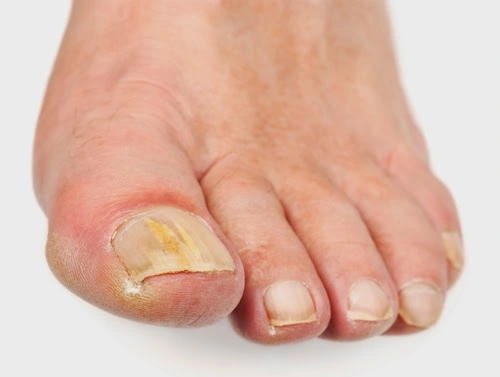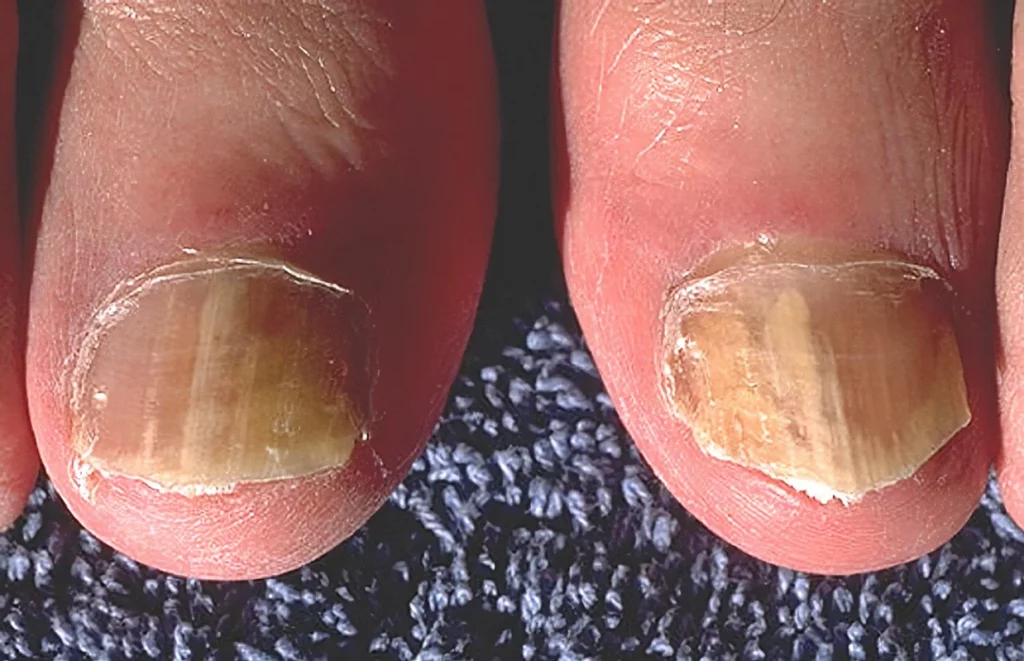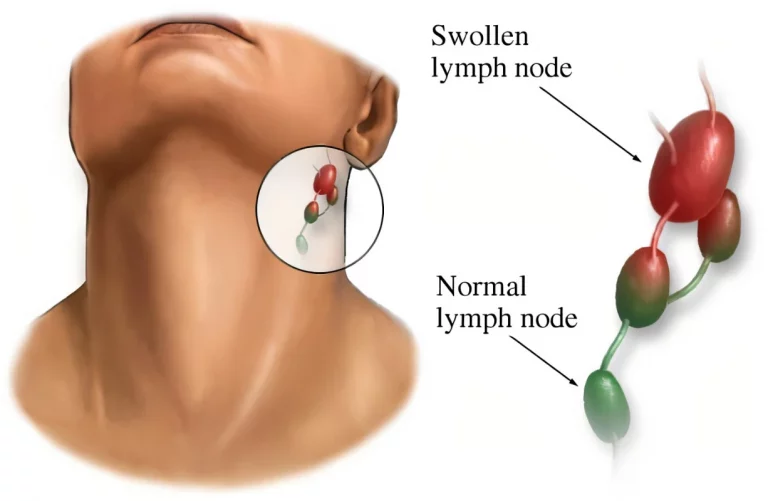Ayurveda Can Help Treat Fungal Nail Infection
Onychomycosis: How Ayurveda Can Help Treat Fungal Nail Infection Before It’s Too Late
Fungal nail infection is a common condition that affects millions of people worldwide. This condition is characterised by yellow or white discolouration of the toe or fingernail, which may become brittle or thick, and even crumble entirely. In severe cases, the infection may become irreversible, which can lead to a partial or full loss of the tissue affected.

While most people believe an antifungal ointment is enough to permanently clear up a fungal nail infection, they are largely mistaken. A fungal infection is more than just skin-deep and its root cause is intricately connected to your body’s pH levels, your pancreas, your environment and, according to Ayurveda, your body constitution.
The Causes of Fungal Nail Infection
Fungi are microorganisms that thrive in wet and oxygen-deprived environments. Different types of fungi can cause different fungal infections. There are even certain types of fungi, like Candida albicans, that already exist inside the human body. When these fungi multiply out of control, they can cause an infection – known as mycosis. When the infection occurs on a toenail or fingernail, this is known as onychomycosis. When the fungus infects the areas between your toes and the skin of your feet, it is known as athlete’s foot (tinea pedis).
Fungal infections can be contagious. Fungal nail infections in particular can spread from one person to another, even by walking on a contaminated floor or touching a contaminated surface.
But contagion is only one of the reasons for fungal infection. Sometimes, the fungi already inhabiting the body may get out of whack, particularly when moisture (like sweat) is continuous and excessive. According to Ayurveda’s dosha concept, this is known as a Kapha (water) aggravation.
There are four main factors that may aggravate the Kapha dosha and instigate or contribute to a fungal overgrowth:

- Humid climate. This is more common in tropical areas or where rainfall is constant and plentiful, inhibiting the body from managing its temperature effectively.
- Overdressing in cold weather. Wearing warm synthetic socks and gloves continuously does not allow your extremities to “breathe” properly and thus causes profuse sweating and moisture.
- Pets. You can catch disease-causing fungi from infected animals. Common pet-borne fungal infections like tinea corporis and salmonellosis are associated with pet ownership.
- Medical causes. There are certain health-related factors that can encourage a fungal overgrowth or be the reason behind its persistence, such as an impaired immune system, mineral deficiencies, or an underlying medical condition like diabetes.
Identifying the root cause behind your fungal nail infection is key to pinpointing the right treatment. But it all starts with symptoms – and addressing the symptoms as early as possible can significantly prevent what may become a serious fungal infection.
Signs and Symptoms of a Nail Fungus Overgrowth

Common signs and symptoms of fungal overgrowth are:
- Thickened or brittle nail
- Yellow or white discolouration (streaks)
- Foul odour
- Light itch
In instances where the infection has occurred and is severe, symptoms may include :
- Intense itch
- Flakiness of the nail
- Crumbling and thinning of the nail
- Lifting of the nail bed
- Swelling and redness
- A visible growth
- Puss secretion under the nail or between the nail and skin (paronychia)
To prevent a full-blown infection that may be irreversible, you should seek medical advice immediately. For mild fungal nail infection treatment, an Ayurvedic practitioner can be consulted.
The Ayurvedic Treatment of Fungal Nail Infection
If you seek to treat your fungal nail infection at the Yatan Clinic, the following fungal nail infection treatment options may be prescribed to you:
- Ayurvedic antifungal oil
A customised antifungal oil will be prescribed to you for topical relief of your symptoms. It will also assist with skin regeneration and repair.
- Ayurvedic herbal medicine
Pitta-boosting Ayurvedic medicine that is customised according to your needs and dosha may be prescribed in addition to the Ayurvedic oil. As fungi thrive in moisture, the aim of such a medicine is to reduce the water element (Kapha) within the body. Bhringaraj, turmeric and cinnamon are commonly used in these herbal decoctions, but only a qualified Ayurvedic practitioner can formulate one and consult on the appropriate dosage.
- Dietary plan
A personalised dietary plan will be prescribed to you depending on your symptoms and dosha. You may also be requested to avoid certain fungi-friendly foods like white bread, processed foods, and sugars while opting for Pitta-boosting foods like spices, ginger, garlic, and onion.
- Yoga and Pranayama
Yoga can be prescribed as a complementary form of therapy to balance your doshas and assist in boosting the body’s overall healing mechanisms. In the case of a fungal infection, it is recommended you do acidity-neutralising breathing techniques like Sitali pranayama (Cooling Breath) and Ujjayi pranayama (Ocean Breath).
- Lifestyle changes
If you are looking for nail fungus treatment in Australia, reach out to us at Yatan Holistic Ayurvedic Centre, call us on 1300 552 260.
- Wearing socks and gloves that are made of 100% natural cotton or wool.
- Changing your socks daily.
- Taking your socks, gloves, and shoes off when you feel sweaty.
- Not wearing the same socks or shoes daily.
- Avoiding synthetic footwear (even certain leather shoes may be treated with a synthetic layer).
- Allowing your feet and fingers to “breathe” as often as possible.
- Avoid polishing your nails often and opt for non-toxic products when you do (ideally once the fungal infection has cleared up).
How to Cure Fingernail Fungus Fast?
- To cure fingernail fungus fast, a customised Ayurvedic antifungal oil can be applied as a topical solution which may provide quick relief from mild itching and odour.
- You may also want to refrain from food items such as white bread, sugars and processed foods.
- Keeping your feet dry and clean is highly recommended.
- Try to incorporate acid neutralising breathing techniques such as Sitali pranayama (Cooling Breath) and Ujjayi pranayama (Ocean Breath).
If you are looking for a safe and nail fungus treatment in Australia, dial 1300 552 260 today!
Conclusion
A fungal infection on the toenails or fingernails can lead to serious complications if left unattended to. Make a prompt appointment with your doctor or visit us at the Yatan Holistic Ayurvedic Centre in Sydney where we can help you treat the infection safely, naturally, and without any side effects.
Frequently Asked Questions
How does Ayurveda treat fungal nail infection?
Ayurveda provides a safe, holistic and no side-effects approach to treating fungal nail infections. The focus of Ayurveda largely lies on balancing the body’s dosha. In addition, Ayurvedic treatments may include dietary modifications, herbal concoction, and lifestyle changes to boost immunity.
What are the Ayurvedic herbs for treating fungal nail infection?
Ayurvedic herbs like Turmeric, Cinnamon and Bhringraj have antimicrobial properties that may help fight fungal nail infections. An Ayurvedic practitioner may suggest to use these herbs both topically and internally.
What are the Ayurvedic home remedies for treating fungal nail infection?
Ayurvedic home remedies for treating fungal nail infection may include application of turmeric paste, tea tree oil, or aloe vera gel. Moreover, maintaining good foot hygiene and keeping the feet clean and dry is also important. Such home remedies might be helpful in alleviating, mild symptoms.
How long does it take for Ayurveda to cure fungal nail infection?
The time period of treatment for fungal nail infection may vary depending on the severity of the infection and the individual’s response to Ayurvedic remedies.
Is Ayurveda effective in treating fungal nail infection?
Ayurveda may be effective in treating mild fungal nail infections. However, individual results may vary, and very severe cases may require immediate medical attention.
What are the side effects of Ayurvedic treatment for fungal nail infection?
Ayurvedic treatments are generally considered safe and side-effect free when used appropriately. It’s important to consult with an Ayurvedic practitioner and talk about any preexisting allergies to ensure the right herbs and remedies are selected for your specific condition.
Should I see a doctor for fungal nail infection?
If you have a fungal nail infection, you may consult a healthcare professional. They can accurately diagnose the severity of your nail infection and recommend appropriate treatment. You may also consult an Ayurvedic practitioner, if you have mild symptoms.
When should I see a doctor for fungal nail infection?
You should see a doctor if you notice symptoms of a fungal nail infection, such as thickening, discoloration continues to persist. Early diagnosis and treatment can help prevent the infection from spreading.
What are the causes of fungal nail infection?
Fungal nail infections are typically caused by fungi known as Candida albicans. These fungi, when multiplied in excess, thrive in warm, moist environments and can infect nails through cuts or cracks in the nail.
How can I prevent fungal nail infection?
There are simple and easy-to-follow steps you can take to prevent fungal nail infection:
- Keep your feet clean and dry.
- Trim your nails regularly.
- Wear breathable shoes and clean socks.
- Refrain from walking barefoot around public areas such as swimming pools or locker rooms.
- Maintain good foot hygiene.
- Refrain from applying toxic laden nail paints.
- Apply ayurvedic oil infused with anti-fungal herbs on your cuticles from time to time.
Are you looking for an all-natural treatment for fungal infection in the toe or fingernail? Contact us today for a phone consultation or book an appointment online.
Disclaimer: This article is not intended to substitute medical advice. All information and resources referenced, including medicinal preparations, fitness, dietary and lifestyle recommendations, are based on the opinion of the author. Please consult a medical practitioner if you require advice or are experiencing any worrisome symptoms.

*Discover holistic healing with a complimentary phone or video consultation from our expert Ayurvedic practitioner. Start your path to better health today!*





















